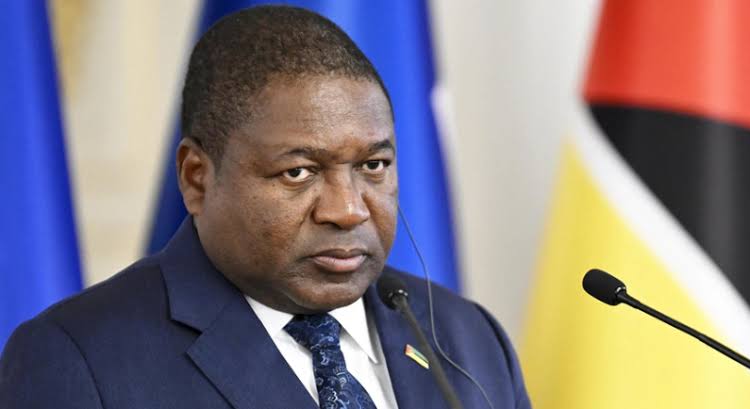Stakeholders have faulted Mozambique President Filipe Nyusi‘s controversial proposal to declare a nationwide state of emergency to curb the escalating violence and widespread destruction following October’s national election.
Mozambique, a Portuguese-speaking country located in southeastern Africa, is currently grappling with a severe security crisis that has seen escalating violence and widespread destruction.
In recent weeks, the country has witnessed a surge in armed attacks, property damage, and growing public unrest.
In response to the alarming situation, Nyusi has made a controversial proposal to declare a state of emergency nationwide.
While this move aims to curb violence, experts and critics warn that it may have unintended consequences, further intensifying the crisis rather than resolving it.
Nyusi’s government has been under increasing pressure to address the mounting violence attributed to armed opposition groups.
These groups, including the small party, Optimistic Party for the Development of Mozambique (Podemos), have been accused of launching violent attacks on civilian infrastructure, government facilities, and military personnel.
The chaos has led to the displacement of thousands of people, further destabilizing an already fragile nation.
The proposal for a state of emergency is a drastic measure that would grant the government sweeping powers to restrict civil liberties and deploy additional security forces to restore order.
However, the decision has been met with widespread scepticism. Many fear the move could exacerbate the existing violence, emboldening opposition forces rather than suppressing them.
READ ALSO: Protests: Talk To Nigerians, CAPPA Urges Tinubu
“Declaring a state of emergency will only give further impetus to the opposition to escalate their violent activities,” said António dos Santos, a political analyst based in Maputo. “Rather than addressing the root causes of the conflict, it risks escalating the violence and undermining efforts toward national reconciliation.”
They contend that the violence in Mozambique stems from political, economic, and social grievances that cannot be addressed by simply suspending civil liberties and deploying more troops.
Experts emphasize that the true solution lies in a comprehensive strategy focused on dialogue, reconciliation, and the strengthening of state institutions.
While the government insists that the state of emergency will restore stability, the broader public remains unconvinced.
“The government’s response so far has been ineffective in stopping the violence,” said Maria Nhambe, a resident of central Mozambique, which has been heavily impacted by recent attacks.
“We need more than just a state of emergency. We need to address the root causes of the conflict and hold those responsible accountable.”
Many feel that the government’s focus on security measures has overshadowed the need for dialogue and justice.
The opposition, which accuses the government of electoral fraud and corruption, has vowed to continue its resistance through armed struggle, rejecting any political solution that does not include fundamental changes in governance.
Human rights organizations have expressed deep concern over the potential for further abuses if a state of emergency is declared.
Despite these warnings, Nyusi remains firm in his stance, arguing that the state of emergency is necessary to restore order and prevent further deterioration of security.
In a recent speech, the president declared, “We must do everything in our power to protect our citizens and defend the sovereignty of our nation. The state of emergency will allow us to confront the violent elements threatening our peace.”
However, experts suggest that Nyusi’s approach is overly simplistic and fails to address the complexities of the situation. “Violence cannot be solved by simply throwing more troops into the mix,” said José Chissano, a former diplomat and peacebuilding advocate.
“The government must engage in a comprehensive effort to understand the underlying issues and work with all stakeholders to find a lasting solution.”
It is increasingly clear that a state of emergency alone will not solve Mozambique’s crisis. Instead, the government must focus on enforcing law and order through established state security agencies, ensuring that those responsible for violence are held accountable through the judicial system.
Moreover, those who feel aggrieved by the electoral process and the government’s actions must be encouraged to seek redress through the proper legal channels.
The courts, not the streets, should be the avenue for resolving political disputes. Fostering trust in the judiciary and promoting transparency in governance are critical steps toward achieving long-term peace and stability in Mozambique.
Despite the challenges, there is still hope that Mozambique can overcome its current crisis. With the right combination of security measures, judicial reforms, and political dialogue, the country can begin the process of healing.
However, time is running out, and the international community must continue to monitor the situation closely to ensure that Mozambique does not descend further into violence.
The Mozambican people deserve peace, stability, and justice. The government must act responsibly and engage all parties in finding a peaceful resolution to the current crisis. Only through dialogue, law enforcement, and a commitment to democratic principles can Mozambique hope to break free from the cycle of violence that has plagued the nation for far too long.


